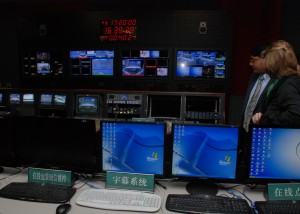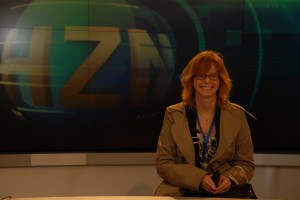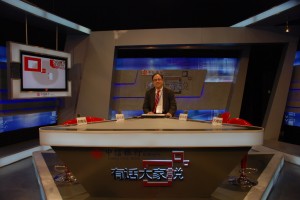Do Not Adjust Your Set
My friends both inside and outside of Indiana University sometimes jokingly refer to me as a propaganda minister. As they say on television, do not adjust your set. That is me, sitting in the anchor’s chair at Hangzhou Television (HTV).
We took a tour on Tuesday (March 14) of the broadcast station, which actually has five news, entertainment and movie channels, and is an example of the regional television outlets, in addition to China Central Television (CCTV), the national TV networks of the People´s Republic of China.
According to Professor Scott Kennedy, Hangzhou Television and other TV and radio broadcasters are torn between commercial viability and government pressures. As in the United States, advertising sales are crucial and so is providing entertainment that attracts the viewers that advertisers want. Print outlets, although also facing scrutiny, appear to have more latitude.
We toured a highly sophisticated control room used in the production of public affairs talk shows. It featured a wall of flat screen monitors, another wall of computers and digital recorders and players and the control panels that anyone who has toured a TV station might remember. All of it is made in Japan.

The production studio at HTV is highly sophisticated and is similar to those at their American counterparts
We also had the opportunity to check out the sets for three TV shows, including that of the nightly newscast, as well as the newsroom.
HTV has about 150 news staff, including reporters, editors, producers and other employees. They cover Hangzhou and a surrounding five-county area. Unlike in the U.S., where four networks have local affiliate stations competing against each other in each market, HTV essentially competes against another similar TV entity, Zhejiang Provincial Television, an administrative organ of the government. It also competes for market share with CCTV’s many offerings (It has channels in the double digits).
We met with news producer Yu Min, who readily acknowledged that he is a Communist Party member and that his station’s coverage reflects the influence of the party. However, it would be unrealistic to suggest that party officials are involve in daily operations.
Many reporters and editors are recruited out of journalism programs in China, Min said, although it also hires many with experience and expertise in others fields. He said about 30 percent of his staff are Communist Party members.

Christine Davis, associate director of the IU Center for International Business Education and Research, appears ready to embark on a new career
Unlike at stations in Indianapolis and other American cities, HTV does not spend much time focused on sports and the weather. In this city of 6.4 million, there are soccer and basketball teams, but they aren’t as popular as sports teams in local U.S. cities. CCTV has a sports channel similar to ESPN (An old friend and a former WISH-TV newsman, Tony Perkins, is one of its star anchors on its English channel).
Of course, for most, visiting the sets was most popular, and as several took the opportunity to sit in the anchor’s chair, perhaps a new star was born.
2 Comments
Sorry, the comment form is closed at this time.



In addition, recording and reproducing an HDTV signal was a significant technical challenge in the early years of HDTV (Sony HDVS). Japan remained the only country with successful public broadcasting analog HDTV, with seven broadcasters sharing a single channel. Digital HDTV broadcasting started in 2000 in Japan, and the analog service ended in the early hours of 1 October 2007.
Comment by LED HDTV on July 25, 2011 4:49 am
This is a nice post. Thanks for it.
Comment by baydizi on February 19, 2012 11:57 pm